Tunisia stands as the Arab Spring’s lone success story ten years after those uprisings began. A willingness to compromise, a weak security sector and a powerful civil society helped Tunisia’s transition to democracy survive its difficult early years. Ironically, these same factors have since constrained the consolidation of Tunisian democracy, writes Sharan Grewal. This article first appeared in the Washington Post.
Ten years after the Arab Spring, Tunisia remains the lone success story. While its neighbors collapsed into civil war or renewed dictatorship, Tunisia has broken the mold, transitioning to democracy in 2011 and maintaining it since. Today, Tunisia’s President Kais Saied is the only head of state in the region who can claim they won a free and fair election.
What explains Tunisia’s political success? Some argue that it’s a small, homogenous country with a high level of development, a well-educated citizenry and with a culture of tolerance. But in 2013, despite these qualities, Tunisia’s transition was on the verge of collapse, with two political assassinations, severe political polarization and the suspension of the country’s sole elected institution. The Tunisian opposition, inspired by Egypt’s coup, took to the streets, calling for the fall of Tunisia’s democratically elected government.
That crisis put Tunisia’s true advantages on full display. The military and security forces stayed out of the fray, political parties came together to find consensus, and well-developed civic institutions helped to mediate the dialogue. Tunisia has since approved one of the world’s most progressive constitutions and held two additional rounds of free and fair elections in 2014 and 2019. Many see Tunisia today as the most democratic country in the Middle East.
But ironically, the same factors that helped Tunisia’s transition survive its early years have since constrained its transition. Each of these factors — a willingness to compromise, a weak security sector and a powerful civil society — have, in their own ways, inhibited the consolidation of Tunisia’s democracy.
A focus on consensus may have shackled the transition
During the transition, Tunisian politicians won high praise for their willingness to compromise and reach consensus. Beji Caid Essebsi, who served as president from 2015 to 2019, and Rached Ghannouchi, the current speaker of the parliament, played a major role in bringing the country together during the crisis of 2013. Despite representing opposite ends of the political spectrum, they formed a grand coalition government that brought together Essebsi’s secular party, Nidaa Tounes, and Ghannouchi’s Islamist party, Ennahda, between 2015 and 2018.
But the emphasis on consensus in the coalition government meant officials largely abandoned controversial but essential demands — transitional justice, security sector reform and structural economic reforms, for instance. Too much consensus left supporters of both sides disenchanted with compromise and moderation, and more willing to support new, more extreme parties in the 2019 elections.
Frustration with Essebsi’s alliance with Ennahda fueled the rise of Abir Moussi’s Free Destourian Party, which calls openly for a reversal to authoritarianism — and currently leads in the polls. Meanwhile, among the Islamists, Ennahda has lost ground to the Karama Coalition, a more hard-line party most recently involved in scuffles in parliament.
The fractured, polarized and almost theatrical nature of the parliament today poses a major threat to the democratic transition, with renewed calls for the president to dissolve the assembly and revert to a strong, presidential system. Consensus politics appear to have produced precisely the polarization and political instability they were designed to avoid.
A weak security sector has diverted Tunisia’s priorities
Former autocrats Habib Bourguiba and Zine el-Abidine Ben Ali had fragmented the security sector, marginalizing the military and privileging the police, national guard and presidential guard. This counterbalancing was a major advantage during the revolution and transition, as the marginalized military stepped aside from Ben Ali and subsequently allowed the transition to proceed without any vested interests. Moreover, counterbalancing meant that without the military, the internal security forces could not on their own preserve Ben Ali nor stage a coup and thwart the transition in 2013.
But Tunisia’s security sector has also constrained the transition. The small military and lack of coordination with the security forces created an initial security vacuum, permitting an attack on the U.S. Embassy in 2012, two political assassinations and major Islamic State attacks in 2015.
These terrorist attacks, in turn, dampened political will to pursue security sector reform, permitting Tunisia’s police forces to continue to commit abuses that fuel grievances toward the political system. These attacks also incurred major economic costs to the tourism sector, while redirecting the budget toward the ministries of interior and defense. Grappling with the weak security sector has meant politicians have largely left unaddressed the economic demands for bread and social justice that fueled the 2011 revolution.
A strong civil society may make economic reforms more difficult
Tunisia has earned praise — and even a Nobel Peace Prize — for its strong civil society. It features both a powerful Tunisian General Labor Union and a united business sector in the Tunisian Union of Industry, Trade and Handicrafts. These institutions, along with the Order of Lawyers and the Tunisian Human Rights League, came together to mediate the National Dialogue in 2013.
But the power of the labor and business sectors has also constrained the transition, as Tunisia’s elected governments have sought to please both sides when trying to craft economic policy. The result has been stagnation. Other than the occasional anti-corruption drive, Tunisia’s economic policy has been largely on autopilot, with no government willing to risk sweeping economic reforms. Tunisians continue to view their government as doing little or nothing to solve the crisis. Their economic grievances remain ready to bubble over once more into mass protests against the system.
Tunisia may be the one democracy to emerge from the Arab Spring, but major challenges remain — including a sluggish economy, police brutality, and disillusionment with the system. Paradoxically, each of these challenges may have been exacerbated by the very factors that helped Tunisia’s democracy survive in the early years of its transition. Its drive for consensus, weak security sector and powerful civil society help to explain both why Tunisia has succeeded and why it has not yet consolidated.
The Brookings Institution is committed to quality, independence, and impact.
We are supported by a diverse array of funders. In line with our values and policies, each Brookings publication represents the sole views of its author(s).

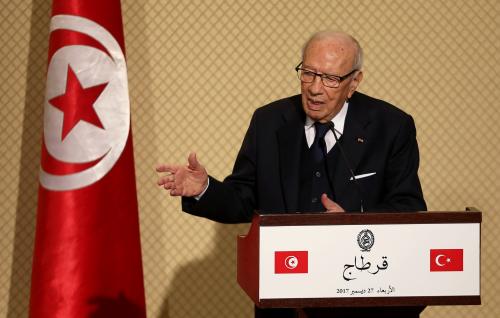
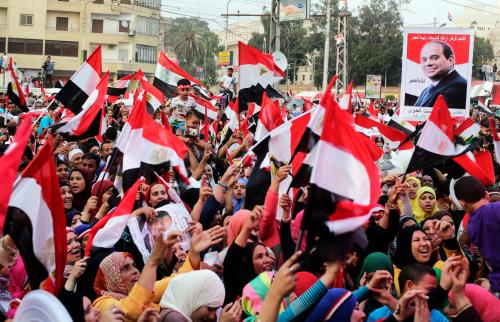
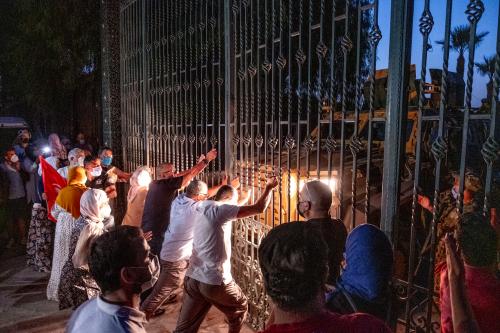

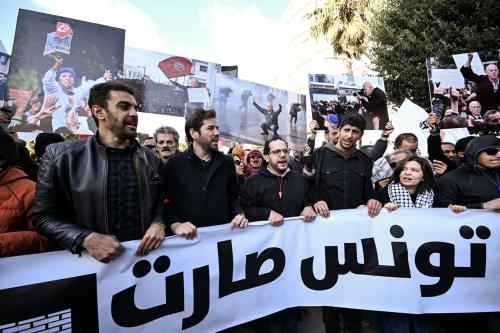
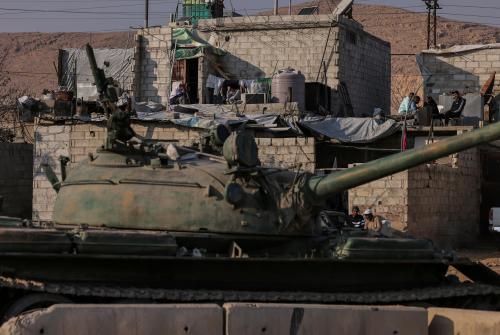
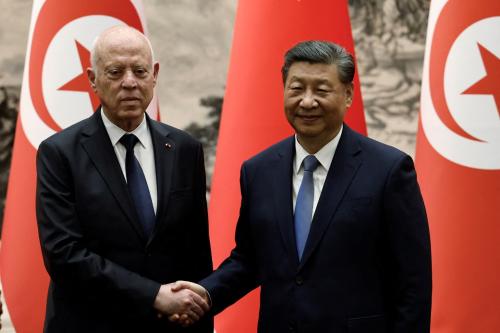
Commentary
Ten years in, Tunisian democracy remains a work in progress
January 22, 2021